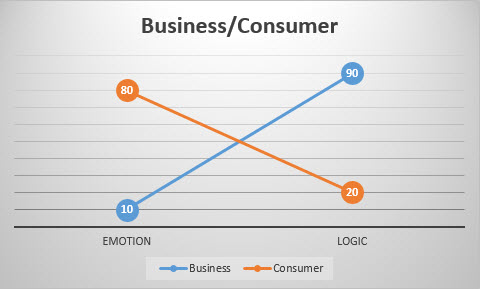 By Bill Scott, President, StoreReport LLC
By Bill Scott, President, StoreReport LLC
Recently, I posted a link to an article regarding the effects Amazon has had on retailers. Many of you will suggests that Amazon has had little effect on the convenience store industry. On its surface I would agree… kind of. But I would also append that remark with the word yet. Nevertheless, it reminds me of the axiom: “The sale of anything affects the sale of everything else.”
The future actions of companies similar to Amazon is a bellwether that no business is assumed ‘safe.’ I would not be surprised by anything that might happen tomorrow. As usual, we only know what we know now, and Amazon’s success is a caution sign to every retail business in America and I’ll tell you why.
Down To Its Lowest Common Denominator, What Is Responsible for Amazon’s Unbelievable Success?
People Don’t Like to be Sold, But They Love to Buy ~ Jeffrey Gitomer
The author of this statement suggests that learning why people buy is “a million times more profitable than selling skills.” He also points out that ‘buying is an emotional state, a feeling so powerful that people will often overpay to get the item they want.’ Amazon makes that possible, and credit cards make it, well, irresistible.
Let me share an example from my own experience
“In order to hunt deer, you have to become the deer.”
As business people, we have the handicap of living in a ‘business world’ where the rules of the ‘social’ world clash. Many years ago, I licensed my software to a third party, which left me looking for something to do. Having a big, fat monthly check coming in for doing nothing, just before Christmas 1988, I moved to the Island of Kauai and planned to retire. After sticking my tourist’s nose into every nook and cranny of ‘paradise,’ out of sheer boredom, I decided to look for a part-time job.
Having over 20 years of computer and software sales experience, I assumed I would be successful ‘selling computers’ in retail stores. So, I took a job at the only store on the Island of Kauai that sold computers… Radio Shack in Lihue. With a sales history of selling over $1 million in computers and software under my belt, the local manager of the store was excited about acquiring my knowledge and skills. It turned out to be one of the greatest miscalculations of his career… and mine. That’s where I got my liberal education in dealing with Mr. and Mrs. Shopper.
Where Businesses Have Budgets, Consumers Have “I’ve Got to Get Me One of Those”
Businesses are usually accountable to someone other than themselves. Successful businesses did not buy computers on a whim. Individuals that had more discretion on what they bought with their own money did. To put it simply, selling to a business is more dependent on logic, where consumers respond better to emotions.
When a business buys a computer system, they want to know, “What will it do for me?” and they make their decisions based on the return on their investment. There was a time back in the 70s when some businesses bought computers on emotion, but those days had been dead and gone for a long time now. ‘Emotion’ often leapfrogs consumers over considering the logic involved in making that decision, so we are confronted with a graph that resembles something like this:

In the late 80s, computers were still a mystery to Mr. and Mrs. Consumer, and in that environment, my error was treating shoppers like business people where ‘emotion’ takes a back seat when making a buying decision. A good salesman needs to switch hats according to which way he or she feels the conversation is going. I had been dealing with business customers for so many years, I say every opportunity as a business problem. Like, if the only tool you have is a hammer, every problem looks like a nail.
In my temporary job at Radio Shack, when a consumer came into the store and indicated they were ‘thinking about buying a computer,’ my experience compelled me to ask, “What do you want the computer to do for you?” Now let me demonstrate how bad I was in this job:
Customer: “Can a computer balance my checkbook?”
Me: “Have you ever balanced your checkbook before.”
Customer: “No.”
Me: “Then a computer is not going to balance it either.”
I know, terrible.
By forcing the consumer to justify his reason for wanting a computer, which he was incapable of doing, after a lot of hemming and hawing, without realizing it, I was forcing the customer to come to the logical conclusion that he had no practical use for an expensive toy, and he or she would leave the store empty handed. I was so conditioned to appeal to a business person, it didn’t take me long to come to the conclusion that consumers were stupid, but in reality, consumers rarely apply logic to buying decisions, in favor of, “I’ve got to get me one of those.”
In the end, the manager took me off of computers and assigned me the job of selling radio-controlled cars. And I sold tons of radio controlled cars for the primary reason that I knew little to nothing about the product I was selling, which, in turn, taught me the lesson of dealing with customers’ emotions rather than tapping into their logic, and it turned out to be the best way to deal with shoppers.
Business people make logical decisions and employ emotion to justify a purchase. Consumers make emotional decisions and use logic after the purchase to explain why they purchased what they did.
Amazon Has Located the Consumer’s Achilles Heel
That’s what Amazon has done. Amazon doesn’t care why you want to buy something, and could care less if you really need it, or what you plan to do with it. Their entire system is satisfying your emotional requirements. Their service is called, “Put the shopper under the ether, and snitch their wallet without them noticing… until the credit card bill arrives.” This is all perfectly legal. If it weren’t for Amazon, someone else would do it. Amazon has tapped into the consumer’s greatest weakness by appealing to their emotions.
Imagine a super store, infinitely large, with high-speed vehicles, driven only by your desires, taking you from one irresistible item to the next. The Internet is a game-changer. No pressure, no guilt, no interruptions, no limits and no unexpected requirements. Given those kinds of choices, the customer will figure out how to pay for it. After all, they have credit cards.
Disposable income, no matter how small, is a power that all of us possess. Opening a savings account, buying a new car, tithing at your chosen house of worship, taking out an insurance policy, going on a trip, acquiring a can of pop… every time money is moved, a ripple effect occurs that has definite, sometimes almost imperceptible consequences. The result of the ‘ripple effect’ creates change. In short, Amazon is draining the pool of disposable income, by tapping into America’s fascination with ‘buying.’
Reactions Lag Change
Reaction always lags change, but change is happening so quickly, not only can we not keep up, our reactions are often too little and too late. Unemployment, the Internet, the push for higher wages, imminent tax increases, regulations, the decrease in disposable income and even same-sex bathrooms add up to a combination of threats to those of us who are unprepared for the alien landscape we are experiencing. Lately, the occurrences of change are not grounded in reality, leaving those so affected to fail at accomplishing what they set out to do.
Technology Compresses Time
Some of us are old enough to remember when mom’s washing machine simply wouldn’t die. It was the original ‘EverReady Bunny.’ Everything we bought was built to last forever, even though we may not have felt it at the time. So we grew up in an environment of permanence. It was easy to expect tomorrow would be much like today. Oh, the dog might have a new litter of puppies, and Mrs. Brown’s cat might climb a tree and require assistance from the fire department; but pretty much, we had confidence that tomorrow would be much the same as today. Without knowing it, our plans were long-term and our reality was stable.
I don’t know when it happened, it was a gradual thing, hardly noticeable; but, little by little I got the sense that tomorrow would NOT be like today at all. I think this has caused us all to become a little paranoid, or at least a little nervous, if you will, and the overall feeling is a loss in our stability. Anyone who has been through an earthquake knows that feeling in a larger scale. Being unsure of one’s footing is not a good feeling, and, consequently, we have responded by paying less attention to being dragged around like a rag-doll and we have failed to see new roads that are bypassing our stolen dreams.
Retailers (all retailers) are caught up in a serious ‘squeeze play.’ Workers are demanding higher wages, jobs are being transferred overseas, competition is occurring with little integrity… and only a few retailers are paying attention; however, more of us are dreading tomorrow than we used to, and we get weary of planning and seeing our plans dashed against the rocks. We don’t get news anymore. We get a plethora of opinions and we are expected to pick through it all and find the truth on our own. Bright people have been forced to pay less attention to their plans, and resigned to a ‘follow the herd’ frame of mind. We have become the tail on the kite, rather than the guy standing on the ground making it fly.
Whether your business is an Amazon-style Internet business or a brick and mortar store located on a real street in a real city, we need to spend more time adapting Amazon’s ideas in our own businesses; and that means guiding our customers through our stores and appealing to their emotions. Concentrate on giving your customers a satisfying shopping experience, and spend less time on driving more traffic into your stores, because if your customers are happy, the traffic will follow. Concentrate more on giving instead of ‘selling.’ GIVE your customers good deals. GIVE your customers sincere compliments. GIVE your customers value. Give your customers appreciation. The more you GIVE the more they will GIVE back.




